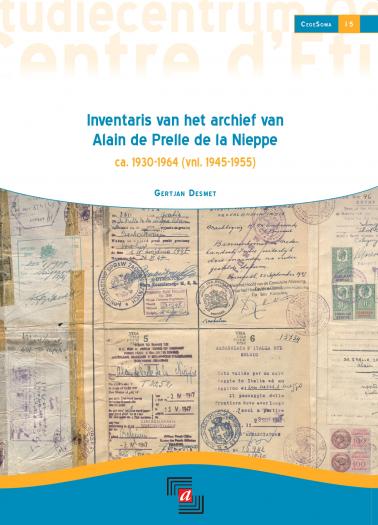A new inventory! The archives of journalist Alain de Prelle de la Nieppe.

Some time ago, we reported that the archives of the reporter Alain de Prelle de la Nieppe had been donated to CegeSoma. The inventory of this archive has now been published and is available for consultation via our search engine ‘Search’, where it can also be downloaded. De Prelle’s fascinating archives (reference 03161) are freely available for consultation.
Alain de Prelle de la Nieppe (1922-1955) travelled to England during the Second World War as a war volunteer and he served in the Belgian Section of the Royal Navy (1941-1945). In the late 1940s, de Prelle made his first forays in journalism. As an independent reporter, he witnessed a number of flashpoints during the early years of the “Cold War”: the Greek civil war, the first wave of decolonization in North Africa and the Middle East, the independence struggles in the Dutch East Indies and French Indochina, the denouement of the Chinese Revolution, the war in Korea, ....
De Prelle's work appeared in Belgian and foreign magazines, but, above all, it was through his contributions to the weekly French-language magazine Moustique and its Dutch-language counterpart Humoradio that he made a name for himself as a “Tintin”-like journalist. In particular, the challenge of Charles Dupuis, director of Éditions Dupuis, to circumnavigate the globe on barely a thousand Belgian francs captured the imagination of the public. De Prelle included his press articles in the books Le Tour du Monde sur un billet de mille (1953), Cent mille kilomètres en système D (1954), Plus riche que Lavarède (1955), Mes aventures avec le Mau-Mau (1955) and Fiancé à l'aventure (1956). In 1955, de Prelle went to Morocco to report on anti-French riots. He was fatally injured in a road accident near Khouribga and died at the age of thirty-two. He was subsequently buried at Antwerp's Schoonselhof cemetery.
The de Prelle de la Nieppe's archives span some four linear meters and date largely from the immediate postwar period (i.e., 1945-1955). They primarily contain documents relating to his career as a journalist and include dozens of manuscripts and articles (typed out by his wife), hundreds of photographs for illustrative purposes, as well as correspondence, notes and travel documents. The archives also contain the manuscripts and typescripts of his books and earlier commercial works (such as promotional texts for airlines). Lectures given by de Prelle in Belgium are documented, among other things, by some 40 posters.
P.S. Do you possess any archival documents (photos, letters, diaries, documents from your association, etc.) relating to the conflicts of the 20th century? Do you wish them to be preserved for future generations? If so, do not hesitate to contact us!